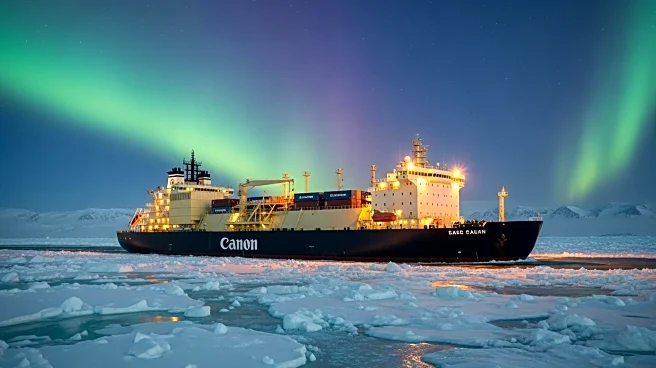What's Happening?
A tanker carrying liquefied natural gas (LNG) from Russia's Arctic LNG 2 project has successfully delivered its cargo to a Chinese port, despite ongoing Western sanctions against the project. The tanker, named La Perouse, docked at the Beihai LNG Terminal in Guangxi, China, on October 9, after loading the LNG cargo in late August. The Arctic LNG 2 project, which is 60% owned by Russian gas producer Novatek, was expected to become one of Russia's largest LNG plants with a projected output of 19.8 million metric tons annually. However, it has been subjected to U.S. sanctions due to Russia's military actions in Ukraine. The operator of the Beihai terminal, PipeChina, has not commented on the delivery, and Reuters was unable to contact the registered owner or commercial manager of the tanker.
Why It's Important?
The delivery of LNG from the Arctic LNG 2 project to China highlights the ongoing complexities in global energy trade amidst geopolitical tensions. Despite U.S. sanctions aimed at curbing Russia's energy exports, the successful delivery indicates that Russia continues to find markets for its LNG, particularly in Asia. This development could have significant implications for global energy markets, potentially affecting LNG prices and supply chains. It also underscores China's strategic role as a major energy consumer willing to engage with sanctioned entities, which may influence international diplomatic and trade relations. The situation reflects broader challenges in enforcing sanctions and the adaptability of global energy networks.
What's Next?
The continued operation of the Arctic LNG 2 project and its ability to deliver LNG despite sanctions may prompt further scrutiny and potential adjustments in international policy. Stakeholders, including governments and energy companies, may need to reassess their strategies regarding energy security and geopolitical alliances. Additionally, the U.S. and its allies might consider tightening sanctions or exploring alternative measures to limit Russia's energy exports. The situation could also lead to increased diplomatic engagement between China and Russia, potentially affecting global energy dynamics and international relations.
Beyond the Headlines
The delivery of LNG from a sanctioned Russian project to China raises ethical and legal questions about the effectiveness and enforcement of international sanctions. It highlights the challenges in balancing geopolitical objectives with economic interests, as countries navigate complex trade relationships. The situation may also influence long-term shifts in global energy policy, as nations seek to diversify energy sources and reduce dependency on politically sensitive regions. Furthermore, it underscores the resilience and adaptability of global energy markets in the face of political disruptions.










